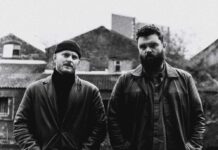
Interview with Jason Netherton by Kevin Stewart-Panko
Photographs by Heidi Strengell
The bond that brings and keeps the members of Misery Index together is rooted as much in the music its four members create as in the message purveyed by the band’s lyrics. Heralded since the early 00s as one of the brighter lights shining from the netherworld of America’s death metal/grindcore scene, the sorta-but-no-longer Baltimore based band has been railing against the corrupt corners of society since the beginning. A quick glance at previous album titles like Retaliate, Traitors, and Heirs to Thievery make it clear that the Misery Index soapbox is a medium for pointing out how the ruling classes over the course of history quash dissent, curtail freedom and liberty, water down education, actively sully the notion of equality, and promote war in the name of remaining the ruling class.
Latest and sixth album Rituals of Power takes on the malleable notion of truth and the potentially disastrous impacts of placing the seemingly simple notion on shaky ground. We caught up with bassist/co-vocalist Jason Netherton to speak the truth about Misery Index’s present-day modus opperandi, life as a resident of Finland, and what happens when you do M.O.D. covers with members of Cannibal Corpse.
How has the lineup being spread between three cities, two countries, and across an ocean impacted the band’s logistical machinations and, specifically, the writing of the new record?
It’s not as hard as it seems given the tools we have available in this day and age. I don’t think we have actually rehearsed and wrote an album in the conventional sense since 2008 for Traitors, I believe. Since then, we’ve used software to demo out everything, and the fact we all live apart has not impeded the basic drive to write good riffs, collate them into songs, and then send them around for input and ideas from the other members via email/Dropbox. I know more and more bands are working like this now, and while I will not argue that some of the mystique of songwriting is removed—the spontaneous riff in the practice space, etc.—it is not something that is missed. If anything, it’s better. The demos have more quality, and we know what we are going to get before we record much more clearly now.
You didn’t gather in one spot as a band at any point?
We never do anymore. We only meet up to rehearse, usually one or two times, before a tour. We are a well oiled machine at this point, and we know each other well enough. We do our homework and fall into line when we meet up, despite how many weeks or months we’ve been apart.
“WE WENT BACK TO SONG STRUCTURES THAT ARE MORE CONVENTIONALLY METAL”
I detect more of a hardcore/punk and old school death metal feel on the new album when compared to the more straight-ahead metal feel of the previous album, The Killing Gods. Agree/disagree?
I don’t know what is what anymore (laughs). It’s whatever comes up when we write riffs, and it’s filtered through the Misery Index four member criticism machine, then refined and refined. I guess I can detect a more straight-ahead vibe on this album, actually. We went back to song structures that are more conventionally metal, more verse/chorus-driven, and we channeled that through what is a Misery Index modeled mix of death metal with a spice of hardcore punk.
How long was Rituals of Powerin the works? Was there a decided direction agreed upon before you started writing or once material started coming together?
The first songs started taking shape in summer of 2017. By fall of that year, the demo version of “I Disavow” was recorded and released on 7-inch in early 2018, and by then we had about half the album done. The last few songs came in just under the buzzer in summer of 2018 and were tracked and mixed by September. There was no real direction aside from the perspective of, “Let’s just try to write the best songs we can, based on what we like and what we would want to hear.”

Was there a particular point in the album’s writing process where it seemed like, “Okay, now we’re on track, and it’s all coming together?”
No (laughs). I think it was all a very stressful and uncertain thing right down to the wire. We knew we had a release date—March 2019—and we knew we had a deadline to meet, so we ran with the deadline and crossed fingers and hoped we would be able to make it happen. Thankfully, we did, and the last songs, which we felt were good enough, were added just before [drummer] Adam [Jarvis] hit the studio to track the drums. The template was set from there.
What sort of lyrical angles were taken on Rituals of Power? Obviously, you’ve been impacted by what Trump’s done to the state of the American union. Was there any talk of trying to avoid going down that road simply because it’s the obvious path, or were you chomping at the bit to have your say?
I think where we are lyrically really started in 2014 with The Killing Godsalbum. We decided then to mix things up a bit and not be so literal, banging out the obvious connections and references that make a song identifiably about X or Y, this or that. In other words, we chose to make the lyrics as biting, provocative, and critical as always, but to also employ more imagery and allegory in the process of hopefully making them more interesting, as well as more durable over time. Trump is an obvious target, but it’s also more interesting to me to ask, “What were the conditions that led us to where we are now?” That is “the what” that underlies the lyrical approach of this album.
Additionally, I remember seeing you guys the day after Trump was elected and the mood being a combination of “Are you fucking kidding me!?” disbelief and joking levity. How have you seen things shift? Was there a particular point that the mood or tone of the situation changed for you?
I think things turned out just as bad as we expected. The mood changed, I guess, when Trump actually got into the White House. The social and political divisions became worse, the binary left/right worldview even more entrenched, democracy itself became in question, and the course of civilization has taken a much darker turn. Need I say more? Ack!
“ALL GOOD THINGS, BETTER SOCIETIES INCLUDED, ARE BORN FIRST FROM THE SEEDS OF OUR COLLECTIVE IMAGINATION.”
Has living in Finland given you a different perspective on life, love, liberty, and the pursuit of happiness? Did you want to explore any of that lyrically?
I have traveled enough throughout the years with the band, or otherwise, to know and see for myself that other ways of doing and being exist. And that the European experiment in social democracy is a better path, despite its limitations in areas that tend to put off many—the biggest one for Americans being higher taxes. Of course, this is an ideological question, but to me such questions are, dare I say, “trumped” by the evidence of the viability and sustainability of such models. The Nordic model specifically, for the long-term health and social equality of the democratic project, has been proven to be a better option, despite its flaws. Of course, there are a world of cultural and historical obstacles that prevent this model from being simply exported and applied to just any other country. But like even the most unattainable anarchist ideals, all good things, better societies included, are born first from the seeds of our collective imagination. The problem is what is “good” is not always understood by all people to be the same thing, and we rarely think collectively about anything anymore. However, if a democracy is functional—and many are not —those differences can be worked out most of the time. As far as lyrically, those kinds of things always creep in, but as mentioned, they are not something that I wanted to focus on literally. We wanted to approach them as a set of observations and statements that were intended to be asking more questions about their own lives.
How does day-to-day life in Finland compare to that in America? And is metal as a music, art form, and lifestyle really as pervasive as a mainstream cultural force as it’s made out to be?
With a population of about five million people in a land nearly the size of California, Finland has been able to get things up and running as a society quite effectively. Things function well and people are taken care of. It’s a cold and harsh place most of the year, and it’s defined by extremes. Given this far north status, extreme dark in the winter is met with extreme light in the summer. When people are not taking care of their affairs, they are usually having a drink, attending to hobbies, sports, music, etc. or going to sauna. It’s pretty laid-back and low stress. As far as metal music, it is somewhat mainstream, and the bigger and more commercial metal bands enjoy large, dedicated followings. Bands like Amorphis play in arenas, while underground death and black metal bands also enjoy very dedicated and active, yet smaller, followings. There are often at least one or two extreme metal shows a week in the Helsinki area, for example.

How and where was the album recorded? The drums were done at Erik Rutan’s studio in Florida. Were those files exported to everyone to work on and record individually?
It was indeed a work of many inputs, authors, and engineers since we all live in different places. Given the available technology, it was easy enough for us all to record in studios near where we live—[guitarist] Darin [Morris] at his home studio in Maryland, me at Soundwell Studio in Espoo, Finland, [guitarist/co-vocalist] Mark [Kloeppel] at Apollo Audio in Columbia, Missouri, and Adam, who actually was the only one who traveled, at Rutan’s Mana studio in St. Petersburg, Florida. All the recordings were then arranged and forwarded to the mixer/master guru Will Putney, who put them all together and brought them to life. So, I guess Putney is the Dr. Frankenstein in this case.
“WHAT IS OR IS NOT TRUE IS REPURPOSED AND RE-ARTICULATED IN ORDER TO RATIONALIZE THE PREVAILING REGIME OF POWER.”
What’s the story behind the title of the record, Rituals of Power?
The title reflects what is a running thread throughout all the tracks on the album—the interrelation of truth and power. Throughout history, truth has been dictated by whom, and under what terms and conditions, power is exercised. With each mode of production and each civilizational order, what is or is not true is repurposed and re-articulated in order to rationalize the prevailing regime of power. These are the rituals of power that steer humanity, often outside of our everyday awareness of them. In today’s context, our internet driven media systems have afforded new modes of power to be concentrated and exercised, to the point where truth and therefore what is real in everyday life are somehow now flexible and malleable concepts that anyone can decide. The resulting chaos, from fake news to echo chambers to ideological bubbles and so on, then represents a key threat to democratic societies that cannot function if the means of discourse are so fragmented and ineffective.
Tell us about the artwork and how it applies to the title.
The cover depicts an otherworldly and abstract wasteland of sorts where the spires that tower up are embedded with the remnants of dead civilizations that have come and gone throughout history. These are civilizations that lived and died according to ways that truth was employed in order to maintain power. It’s only my interpretation, but the idea was to keep its meaning less concrete, aside from the tablet that the one skeleton is clutching, which says, “Veritas,” or Latin for “Truth.” Or in this case, the death of truth.
Was there anything in particular about choosing Nailbomb and M.O.D. for cover renditions?
Not really. We have been joking around about the M.O.D. song [“Man of Your Dreams”] forever, as it’s kind of a silly song about Freddy Kruger, and we would always jam it with [Cannibal Corpse guitarist] Rob Barrett when we were on tour with them in Europe years ago. So, when it came time to decide about bonus tracks, we decided to track that and have Barrett sing it. The Nailbomb song [“Wasting Away”] was just a fun, straight-ahead song we always liked as well, and it was pretty easy to get together, so why not? Unfortunately, Alex Newport was not available for guest vocals, though.
After the upcoming European tour, do you have a plan laid out for the rest of the year?
We will hit the US and Canada. We are just waiting for the right offer to arise that fits with our schedules. We are all pretty busy these days, so the stars have to align in weird ways for us to make things happen. I guess that is called trying to balance being responsible adults with the permanent adolescent lure of being a touring metal musician.





















